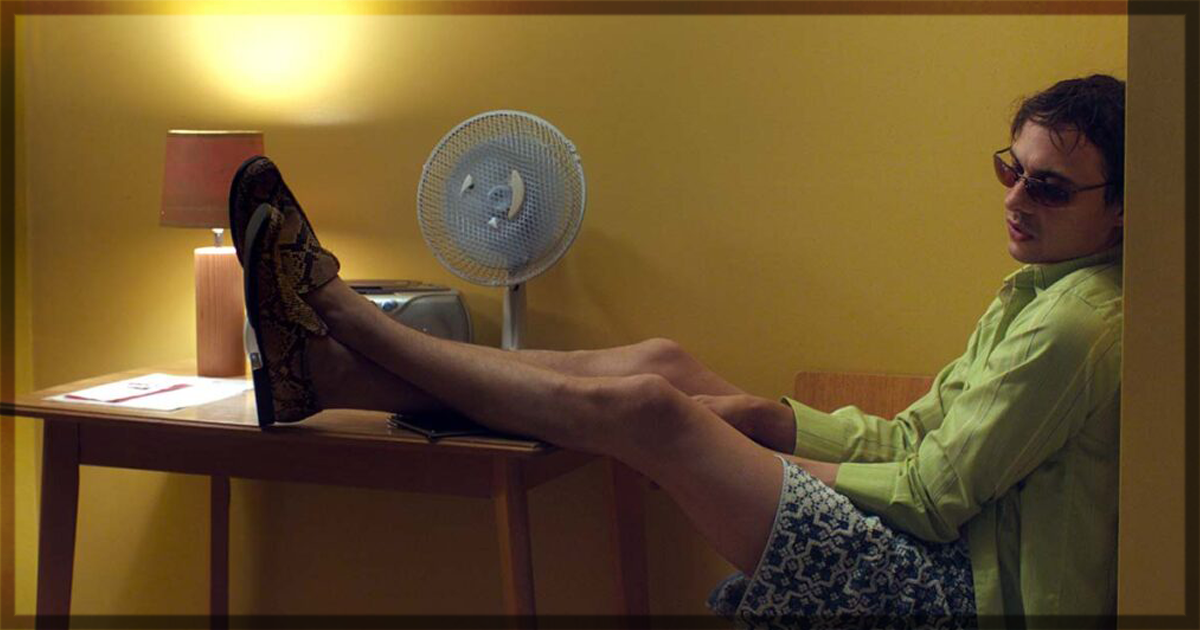With Urchin, Harris Dickinson – one of the UK’s brightest young stars – makes the move from actor to director like so many before him. He does not star in this debut feature, making only an uncredited featured appearance early on in this story of a young rough-sleeping drug addict. Avoiding this temptation to lead onscreen and offscreen lets Dickinson instead shine a spotlight on Frank Dillane as Mike, extracting and expanding a stellar performance from him and the entire cast of this urgent, frustrating, and strangely captivating tale that is never mined for sheer misery.
Early in Urchin, Mike says he has not had a roof over his head for five years. He is given to exaggeration in his garrulous, twitchy exchanges – mostly one-off with people he will never see again – but Dickinson’s script gives viewers no reason to doubt this. He is a live wire sleeping in parks and getting money and food however he can, but there is a charm and disarming, unforced vulnerability that pulls at the heartstrings even as he falls between the cracks. His existence is volatile and prone to violence; when Nathan (Dickinson) beats him up and steals his hard-won cash, a stranger checks in with Mike and offers to buy him lunch. But Mike, in a moment of pure thoughtless desperation, beats up the samaratin and steals his watch, ending up back in jail. But an offer of rehabilitation is extended, and on parole, glimmers of a future begin to emerge: stable lodgings, a job, a career plan, maybe even a romance. But sometimes even the best intentions of Mike and those around him – opportunities, restorative justice initiatives, connection, stability – are not enough to save someone from their worst impulses.
Urchin drives home the dehumanising reality of homelessness. Mike asks for spare change over and over, barely changing the cadence and tone of his words but stumbling over them as people walk by him on all sides as if he were invisible (a scene many, if not all, viewers will have seen play out in real life). Dillane – all awkward angles of crooked smiles and hunched postures – makes this imposed transparency impossible to look away from.
Mike is a very hard character to fully love, and Dillane and Dickinson are not interested in sanding off his rough edges. In a world that often demands its victims and outcasts be perfect in order to be worthy of love, Urchin shows us the falseness of this paradigm. Human dignity is innate and unalienable – even as Mike makes mistake after mistake, driving away those who could and will help, it is hard to root against his success.
On the whole, Urchin is remarkably well and confidently made, especially for a first feature by such a young director. The storytelling consists of vignette-like scenes stitched into a narrative, keeping a chronological order while not quite defining the time jump between some segments. The effect is in one way impressionist, the other neo-realist. Dickinson’s use of establishing shots to capture Mike’s world outside his eyes is especially remarkable; there is a temptation for actors moving into directing to take perspective too literally, either focusing too intently on capturing actors’ performances at all moments or showing environments only through the “character’s” point of view. Dickinson and Director of Photography Josée Deshaies use their lenses to instead frame how the world moves around Mike, impacting him and yet indifferent to his struggles.
At the age of 29, Dickinson can no longer be called a rising star; following his breakout in Eliza Hittman’s 2017 film Beach Rats (where he did his first more-than-passable American accent) he has made his mark in British, American, and Canadian films convincingly playing characters from small-time drug dealers (County Lines) to an arrogant but charming businessman (Matthias et Maxime) to a model with hidden depth (Triangle of Sadness) to young father learning responsibility (Scrapper) to a doomed American wrestler (The Iron Claw) to an intern exploring domming with his boss (Babygirl).
His effortless, unshowy transformation across genres, nationalities, and personalities marks him as one of the most talented performers of his generation. Behind the camera, he brings out this similar eye for detail and believability, adding a keen eye for visuals beyond merely the pragmatic conveyance of plot. One hopes he has many more films in him both behind and in front of the camera.
Urchin could become “poverty porn” very easily, allowing those of us comfortably in cinema chairs to look out with pity at the unhoused without reflecting on the way our societies and lives are set up to avoid these ugly truths – and how easy it is, through medical, economic, and many other misfortunes, for us to join Mike’s reality. A film, of course, cannot change lives, and Urchin makes no claim to do so. What the creators and audiences of Urchin do after leaving the project or cinema is beyond the scope of the film, and this is not a mawkish documentary meant to wring out charity money and pledges to change the world. What Urchin is a human drama about one man who slipped into precarity and addiction and the deeply unstable paradox of a “stable” life. Astutely observed, stylishly told, and impeccably acted, it is one of the year’s best independent British films.
Urchin is in UK cinemas on Friday 3 October.
Learn more about the film at the IMDB site for the title.


